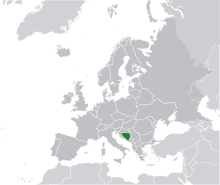Maryland–Bosnia and Herzegovina National Guard Partnership
Appearance
| Part of the U.S. European Command State Partnership Program | |
 Flags of Maryland and Bosnia and Herzegovina | |
| Origin | 2003 |
|---|---|
| Country president | dr. Mladen Ivanić |
| Minister of defense | Zekerijah Osmić |
| Ambassador to U.S. | Jadranka Negodic |
| Ambassador to Bosnia and Herzegovina | Patrick Moon |
| Adjutant general | MG Linda L. Singh |
| 2012 Engagements | 19[1] |
| NATO member | No |
| EU member | No |

The Maryland–Bosnia and Herzegovina National Guard Partnership is one of 22 European partnerships that make-up the U.S. European Command State Partnership Program and one of 65 worldwide partnerships that make-up the National Guard State Partnership Program.[2] The partnership was established in 2003 and has become integral to Bosnia and Herzegovina’s post-war military integration and in their ongoing NATO accession process. The current focus is on a joint-deployment to Afghanistan, AT exchanges with key BiH units, and supporting BiH’s NATO Partnership for Peace goals.[3]
History





- War ended in 1995 with Dayton Accord signing (still the constitutional document), army integrated in 2006
- BiH given conditional NATO Membership Action Plan (MAP) in 2010 (have not met condition on defense property)
- The Armed Forces are the most integrated, most effective national institution, but have been negatively affected by the political tumult.
- Bosnia and Herzegovina is unique in the European AOR in its internal political paralysis due to fundamental differences between its constituent “ethnicities” over what the country should look like. Though conflict is unlikely, in its current state, BiH is “virtually ungovernable” with no sign of agreement on reforms necessary to change that.[3]
Partnership focus
Way forward
- See through an embedded-deployment between MDNG Military Police and AFBiH Military Police (Staff Officers and PSD)
- Expand the Unit Level Exchanges occurring between AFBiH and MDNG during unit ATs (increasing US-BiH interoperability)
- Look to expand “whole-of-government” cooperation (i.e. Intl. Relations/Security Studies student exchanges)[3]
2013 Planned Events
- Multiple TCTs based on BiH PARP goals
- Expanded slate of ULFs, at least 1 occurring in BiH[3]
References
- ^ "2012 EUCOM SPP Events" (PDF). U.S. European Command. Retrieved 11 February 2013.
- ^ "National Guard SPP". The National Guard. Retrieved 19 October 2012.
- ^ a b c d "SPP Data" (PDF). U.S. European Command. Retrieved 22 January 2013.
